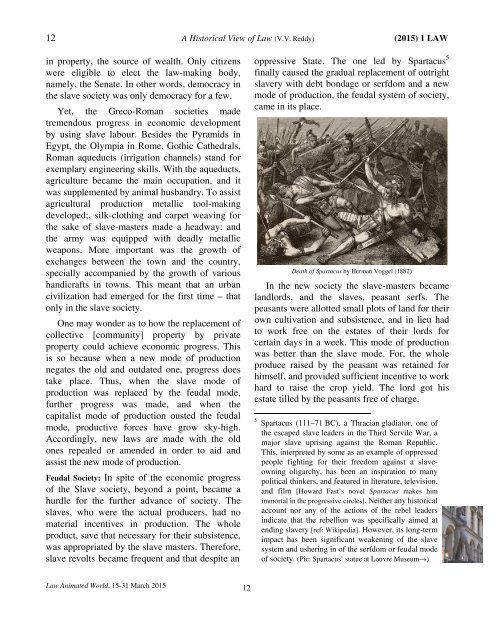Editor: I. Mallikarjuna Sharma Volume 11: 15-31 March 2015 No. 5-6
Martyrs memorial special issue of 15-31 March 2015 paying tributes to Bhagat Singh and other comrades.
Martyrs memorial special issue of 15-31 March 2015 paying tributes to Bhagat Singh and other comrades.
You also want an ePaper? Increase the reach of your titles
YUMPU automatically turns print PDFs into web optimized ePapers that Google loves.
12 A Historical View of Law (V.V. Reddy) (20<strong>15</strong>) 1 LAW<br />
in property, the source of wealth. Only citizens<br />
were eligible to elect the law-making body,<br />
namely, the Senate. In other words, democracy in<br />
the slave society was only democracy for a few.<br />
Yet, the Greco-Roman societies made<br />
tremendous progress in economic development<br />
by using slave labour. Besides the Pyramids in<br />
Egypt, the Olympia in Rome, Gothic Cathedrals,<br />
Roman aqueducts (irrigation channels) stand for<br />
exemplary engineering skills. With the aqueducts,<br />
agriculture became the main occupation, and it<br />
was supplemented by animal husbandry. To assist<br />
agricultural production metallic tool-making<br />
developed;, silk-clothing and carpet weaving for<br />
the sake of slave-masters made a headway; and<br />
the army was equipped with deadly metallic<br />
weapons. More important was the growth of<br />
exchanges between the town and the country,<br />
specially accompanied by the growth of various<br />
handicrafts in towns. This meant that an urban<br />
civilization had emerged for the first time – that<br />
only in the slave society.<br />
One may wonder as to how the replacement of<br />
collective [community] property by private<br />
property could achieve economic progress. This<br />
is so because when a new mode of production<br />
negates the old and outdated one, progress does<br />
take place. Thus, when the slave mode of<br />
production was replaced by the feudal mode,<br />
further progress was made, and when the<br />
capitalist mode of production ousted the feudal<br />
mode, productive forces have grow sky-high.<br />
Accordingly, new laws are made with the old<br />
ones repealed or amended in order to aid and<br />
assist the new mode of production.<br />
Feudal Society: In spite of the economic progress<br />
of the Slave society, beyond a point, became a<br />
hurdle for the further advance of society. The<br />
slaves, who were the actual producers, had no<br />
material incentives in production. The whole<br />
product, save that necessary for their subsistence,<br />
was appropriated by the slave masters. Therefore,<br />
slave revolts became frequent and that despite an<br />
oppressive State. The one led by Spartacus 5<br />
finally caused the gradual replacement of outright<br />
slavery with debt bondage or serfdom and a new<br />
mode of production, the feudal system of society,<br />
came in its place.<br />
Death of Spartacus by Herman Voggel (1882)<br />
In the new society the slave-masters became<br />
landlords, and the slaves, peasant serfs. The<br />
peasants were allotted small plots of land for their<br />
own cultivation and subsistence, and in lieu had<br />
to work free on the estates of their lords for<br />
certain days in a week. This mode of production<br />
was better than the slave mode. For, the whole<br />
produce raised by the peasant was retained for<br />
himself, and provided sufficient incentive to work<br />
hard to raise the crop yield. The lord got his<br />
estate tilled by the peasants free of charge.<br />
5<br />
Spartacus (<strong>11</strong>1–71 BC), a Thracian gladiator, one of<br />
the escaped slave leaders in the Third Servile War, a<br />
major slave uprising against the Roman Republic.<br />
This, interpreted by some as an example of oppressed<br />
people fighting for their freedom against a slaveowning<br />
oligarchy, has been an inspiration to many<br />
political thinkers, and featured in literature, television,<br />
and film [Howard Fast’s novel Spartacus makes him<br />
immortal in the progressive circles]. Neither any historical<br />
account nor any of the actions of the rebel leaders<br />
indicate that the rebellion was specifically aimed at<br />
ending slavery [ref: Wikipedia]. However, its long-term<br />
impact has been significant weakening of the slave<br />
system and ushering in of the serfdom or feudal mode<br />
of society. (Pic: Spartacus’ statue at Louvre Museum→)<br />
Law Animated World, <strong>15</strong>-<strong>31</strong> <strong>March</strong> 20<strong>15</strong> 12



